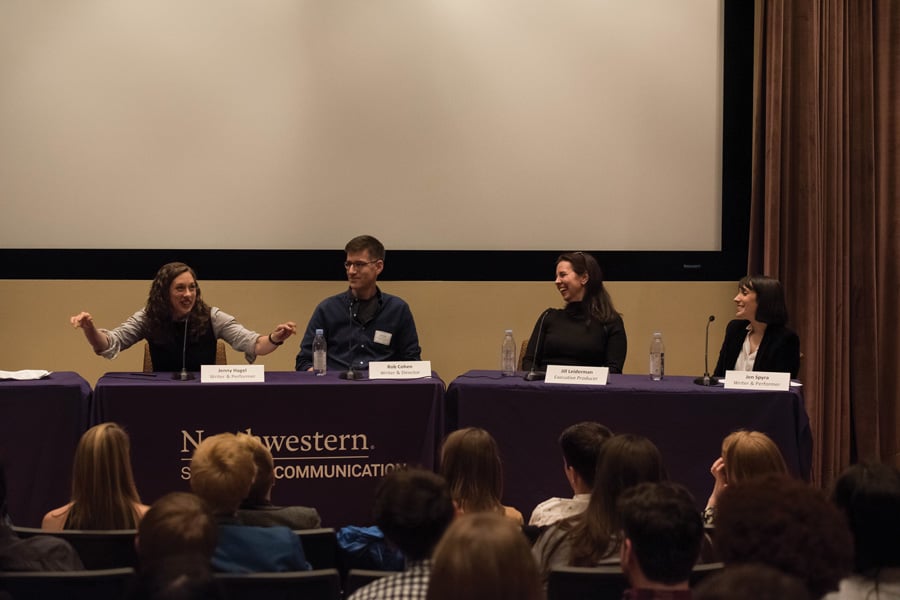Panelists discuss how late night comedy TV presents news to audiences
Katie Pach/Daily Senior Staffer
Comedians speak during a writer’s panel in Annie May Swift Hall on Friday. The speakers discussed the function of late night television comedy in a contentious political climate and offered advice for aspiring students.
May 14, 2017
Four late night comedy mainstays said humor is a way to understand current events in today’s political climate, as it allows people to absorb serious news in a lighthearted way. The comedians, who visited campus Friday for a panel held at Annie May Swift Hall, said TV comedy offers viewers a respite from the news cycle.
The four panelists — Jenny Hagel, a writer for NBC’s “Late Night with Seth Meyers;” Rob Cohen, who has written for and directed shows including “Saturday Night Live” and “The Simpsons;” Jill Leiderman, executive producer of ABC’s “Jimmy Kimmel Live!”; and Jen Spyra, a writer and performer on CBS’s “The Late Show with Stephen Colbert,” — discussed how their shows make jokes about national problems. About 75 people attended the event hosted by the School of Communication’s Office of External Programs, Internships and Career Services and the MFA in writing for screen and stage program.
The four panelists, moderated by Radio, Television and Film department chair David Tolchinsky, spoke about their personal experience in comedy and gave advice about how to succeed as a comedian.
Leiderman said “Jimmy Kimmel Live!” can help the general public digest intimidating issues, such as the election and health care. At the end of a long day, viewers can understand the news cycle from the unique lens of TV comedy, she said.
“It’s the most intimate space on television,” Leiderman said. “When all you want to do is decompress, you can lose yourself in how someone funny sees the day’s events.”
She said though comedy has always served this function, it has been particularly important in the past six months as a result of the presidential election.
Hagel said comedy should function as a “cultural CliffsNotes.” Just like CliffsNotes can be read to increase comprehension, she said, late night TV aids the public in rationalizing the nation’s sporadic news cycle.
When crafting jokes related to political issues, the speakers said personal experience is invaluable. Spyra said each staff member brings their own “world of reference” that is critical to their comedy.
Cohen said bringing unique perspectives to the table allows writers to stay away from repeating comedic tropes.
“Personal experience is your best asset,” he said. “That kind of diversity is a great thing in a room. That way, you’re not doing the classic ‘robot banana fart jokes,’ but finding new angles.”
The speakers also offered strategies to help students get their foot in the door of the competitive comedy world. Leiderman said students should display a “voracious appetite” to work with a particular show and direct their energy toward being a part of that team.
Communication freshman Emmanuelle Gers, who attended the event, said the speakers affirmed her interest in writing comedy for television. The panelists’ personal experiences exposed a broad range of paths that can lead to the same profession, she said.
“They showed how you can really do it on your own and be your own activator,” Gers said. “But it also reminded me that I have a long way to go.”
Email: annalaffrey2020@u.northwestern.edu
Twitter: @annalaffrey



